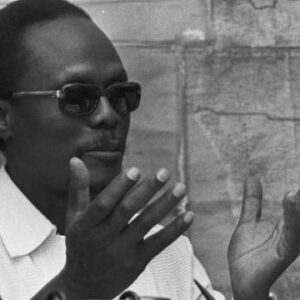Holden Roberto was an Angolan nationalist who founded the Angolan National Liberation Front (FNLA). He was one of the founding fathers of Angola’s independence and a pivotal figure in Africa’s Cold War. He worked tirelessly to liberate Angola from Portuguese colonialism. For centuries, Angola was ruled by the Portuguese, and Roberto was one of the first men to fight for the country’s complete independence from the Portuguese. While working for the Belgian Finance Ministry as a young man, he witnessed Portuguese officials abusing an elderly man. This injustice convinced him that it was past time for Angolans to fight for their independence and dignity, and thus inspired him to enter politics. He co-founded the Union of Peoples of Northern Angola (UPNA) with a friend, which was later renamed the Union of Peoples of Angola (UPA). He also became involved in underground activities, traveling secretly to Ghana to attend the revolutionary All African People’s Congress. Upon his return to Angola, he became heavily involved in politics, eventually founding the National Front for the Liberation of Angola, a militant right-wing organization that he led in the fight for Angolan independence from Portugal forces. He was a pioneer of Angola’s national liberation struggle and is hailed as a hero for leading the country’s independence struggle.
Childhood & Adolescence
He was born in So Salvador, Angola on 12 January 1923 to Garcia Diasiwa Roberto and Joana Lala Nekaka. In 1925, his family relocated to Léopoldville, Belgian Congo. He attended a Baptist missionary school and graduated in 1940.
Career of Holden
He eventually found work at the Belgian Finance Ministry in Léopoldville, Bukavu, where he remained until the early 1950s. In 1951, while visiting Angola, he witnessed Portuguese officials abusing an elderly man and became aware of colonial rule’s brutality.
This encounter motivated him to enter politics and fight for Angola’s independence from Portuguese rule. In 1956, he co-founded the Union of Peoples of Northern Angola (UPNA) with a friend, Barros Necaca. It was later renamed the Union of Angolan Peoples (UPA).
He served as president of the UPA and secretly attended Ghana’s All-African Peoples Congress in December 1958, representing Angola. There he met Patrice Lumumba, the Democratic Republic of the Congo’s future Prime Minister, Kenneth Kaunda, Zambia’s future President, and Kenyan nationalist Tom Mboya.
Roberto obtained a Guinean passport and represented his movement at the United Nations. In 1961, he appointed Jonas Savimbi as the UPA’s Secretary-General.
He began receiving assistance from the United States National Security Council in the 1950s, initially for $6,000 and later for $10,000.
On March 15, 1961, he led an incursion into Angola with a group of 4,000 to 5,000 militants, seizing farms, government outposts, and trading centers and slaughtering anyone they encountered en route. This bloody massacre claimed the lives of over 1,000 white people and several indigenous people.
He merged the UPA and the Democratic Party of Angola in 1962 to form the Angolan National Liberation Front (FNLA). He established the Revolutionary Government of Angola in Exile (GRAE) a few weeks later and appointed Savimbi as Foreign Minister.
However, tensions between Savimbi and Roberto developed, and Savimbi left the FNLA in 1964 to found the National Union for the Total Independence of Angola (UNITA), dividing the former allies into bitter political rivals.
By the mid-1960s, three political groups were fighting the Portuguese government for independence: the FNLA, UNITA, and the Popular Movement for the Liberation of Angola (MPLA), which was led by writer and statesman Viriato da Cruz. The struggles continued until the mid-1970s, when Roberto and the leaders of two other political parties signed peace accords with Portugal in April 1975, paving the way for Angola’s independence the following year.
UNITA, the MPLA, and the FNLA agreed to form a coalition government under the terms of the agreement.
However, clashes between the groups resulted in outbreaks of violence, which eventually culminated in a civil war.
The war raged for years at a time, lasting nearly three decades and claiming approximately 500,000 lives and displacing thousands more. Roberto was forced into exile by circumstances, though he eventually returned to Angola in 1992.
In 1992, the first multiparty elections were held, and several FNLA members participated; however, the party garnered only 2% of the popular vote. The MPLA won the general elections, and Roberto became one of the MPLA’s most outspoken critics.
Personal History and Legacies
He was married at the time he met Zairian President Mobutu Sese Seko. He divorced his first wife, however, in order to form a political alliance with him, and married a woman from Mobutu’s wife’s village.
He suffered from heart problems in his later years and died on 2 August 2007 at his home in Luanda of a cardiac arrest. He was 84 years old.
Estimated Net Worth
The net worth of Roberto is $12million.


